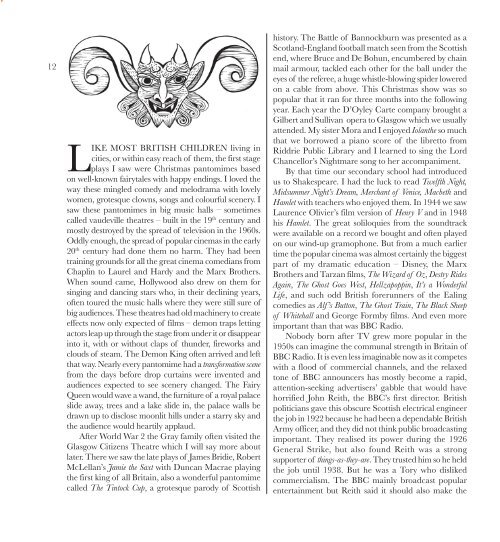A Gray Play Book by Alasdair Gray sampler
Long and short plays for stage, radio and television, acted between 1956 & 2009, an unperformed opera libretto, excerpts from The Lanark Storyboard and full film script of the novel Poor Things by Alasdair Gray.
Long and short plays for stage, radio and television, acted between 1956 & 2009, an unperformed opera libretto, excerpts from The Lanark Storyboard and full film script of the novel Poor Things by Alasdair Gray.
Create successful ePaper yourself
Turn your PDF publications into a flip-book with our unique Google optimized e-Paper software.
12<br />
L<br />
IKE MOST BRITISH CHILDREN living in<br />
cities, or within easy reach of them, the first stage<br />
plays I saw were Christmas pantomimes based<br />
on well-known fairytales with happy endings. I loved the<br />
way these mingled comedy and melodrama with lovely<br />
women, grotesque clowns, songs and colourful scenery. I<br />
saw these pantomimes in big music halls – sometimes<br />
called vaudeville theatres – built in the 19 th century and<br />
mostly destroyed <strong>by</strong> the spread of television in the 1960s.<br />
Oddly enough, the spread of popular cinemas in the early<br />
20 th century had done them no harm. They had been<br />
training grounds for all the great cinema comedians from<br />
Chaplin to Laurel and Hardy and the Marx Brothers.<br />
When sound came, Hollywood also drew on them for<br />
singing and dancing stars who, in their declining years,<br />
often toured the music halls where they were still sure of<br />
big audiences. These theatres had old machinery to create<br />
effects now only expected of films – demon traps letting<br />
actors leap up through the stage from under it or disappear<br />
into it, with or without claps of thunder, fireworks and<br />
clouds of steam. The Demon King often arrived and left<br />
that way. Nearly every pantomime had a transformation scene<br />
from the days before drop curtains were invented and<br />
audiences expected to see scenery changed. The Fairy<br />
Queen would wave a wand, the furniture of a royal palace<br />
slide away, trees and a lake slide in, the palace walls be<br />
drawn up to disclose moonlit hills under a starry sky and<br />
the audience would heartily applaud.<br />
After World War 2 the <strong>Gray</strong> family often visited the<br />
Glasgow Citizens Theatre which I will say more about<br />
later. There we saw the late plays of James Bridie, Robert<br />
McLellan’s Jamie the Saxt with Duncan Macrae playing<br />
the first king of all Britain, also a wonderful pantomime<br />
called The Tintock Cup, a grotesque parody of Scottish<br />
history. The Battle of Bannockburn was presented as a<br />
Scotland-England football match seen from the Scottish<br />
end, where Bruce and De Bohun, encumbered <strong>by</strong> chain<br />
mail armour, tackled each other for the ball under the<br />
eyes of the referee, a huge whistle-blowing spider lowered<br />
on a cable from above. This Christmas show was so<br />
popular that it ran for three months into the following<br />
year. Each year the D’Oyley Carte company brought a<br />
Gilbert and Sullivan opera to Glasgow which we usually<br />
attended. My sister Mora and I enjoyed Iolanthe so much<br />
that we borrowed a piano score of the libretto from<br />
Riddrie Public Library and I learned to sing the Lord<br />
Chancellor’s Nightmare song to her accompaniment.<br />
By that time our secondary school had introduced<br />
us to Shakespeare. I had the luck to read Twelfth Night,<br />
Midsummer Night’s Dream, Merchant of Venice, Macbeth and<br />
Hamlet with teachers who enjoyed them. In 1944 we saw<br />
Laurence Olivier’s film version of Henry V and in 1948<br />
his Hamlet. The great soliloquies from the soundtrack<br />
were available on a record we bought and often played<br />
on our wind-up gramophone. But from a much earlier<br />
time the popular cinema was almost certainly the biggest<br />
part of my dramatic education – Disney, the Marx<br />
Brothers and Tarzan films, The Wizard of Oz, Destry Rides<br />
Again, The Ghost Goes West, Hellzapoppin, It’s a Wonderful<br />
Life, and such odd British forerunners of the Ealing<br />
comedies as Alf’s Button, The Ghost Train, The Black Sheep<br />
of Whitehall and George Form<strong>by</strong> films. And even more<br />
important than that was BBC Radio.<br />
Nobody born after TV grew more popular in the<br />
1950s can imagine the communal strength in Britain of<br />
BBC Radio. It is even less imaginable now as it competes<br />
with a flood of commercial channels, and the relaxed<br />
tone of BBC announcers has mostly become a rapid,<br />
attention-seeking advertisers’ gabble that would have<br />
horrified John Reith, the BBC’s first director. British<br />
politicians gave this obscure Scottish electrical engineer<br />
the job in 1922 because he had been a dependable British<br />
Army officer, and they did not think public broadcasting<br />
important. They realised its power during the 1926<br />
General Strike, but also found Reith was a strong<br />
supporter of things-as-they-are. They trusted him so he held<br />
the job until 1938. But he was a Tory who disliked<br />
commercialism. The BBC mainly broadcast popular<br />
entertainment but Reith said it should also make the


















